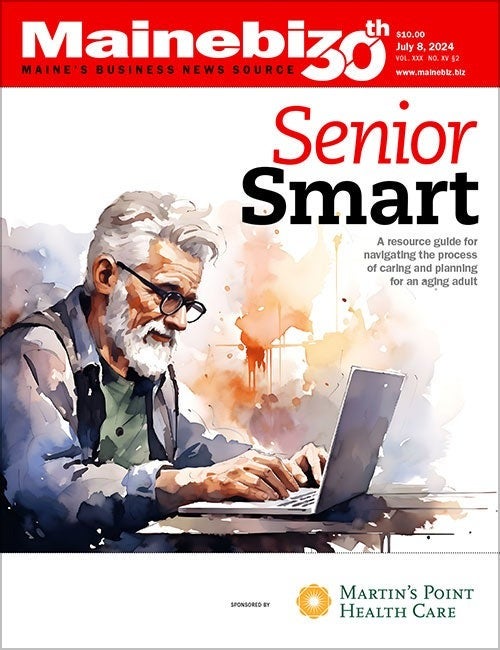$40M grant program launches to aid Maine hospitality, retail businesses
Maine's hospitality and retail sectors, hard-hit by restrictions intended to slow the spread of COVID-19, can apply for $40 million in grants to help weather the crisis, Gov. Janet Mills announced Monday.
The state also announced a similar $30 million program for health care industry businesses that provide MaineCare, the state's version of Medicaid, which weren't eligible for the Maine Economic Recovery Grant program for small businesses.
The Tourism, Hospitality & Retail Recovery Grant Program is focused specifically on supporting Maine’s service-sector small businesses, including restaurants, bars, tasting rooms, lodging and retail shops. The businesses have not only been hit hard by the pandemic, but face further challenges as winter closes in. To determine eligibility, the program looks at sales losses between March and September from applicants.
Tourism and retail support more than 100,000 jobs in the state and accounted for $7 billion of the state's economy in 2019. Mills, in announcing the grants, noted that the industries are "a vital part of Maine's economy."
“In the face of this unrelenting pandemic, many of these businesses have adapted with classic Maine grit and resilience but still face historic and unprecedented challenges," Mills said in a news release. "I hope this program will help provide at least a small amount of financial support to sustain them through these difficult times. I continue to urge Congress to pass additional, robust relief for Maine people and businesses.”
Both the tourism and hospitality grant program and the health care one are backed by $30 million each from the federal CARES Act Coronavirus Relief Fund. The hospitality and retail program's money is from the Maine Economic Recovery Grant Program launched in August by the Department of Economic and Community Development, and also includes an additional $10 million from the federal money.
Tourism, hospitality, retail grants
Heather Johnson, commissioner of the Department of Economic and Community Development, said the hospitality and retail grant program was developed with input from the industry. "We have created a grant program that allows businesses to determine their most urgent needs specific to their individual business," she said.
The Maine Economic Recovery Grant Program requires a business to demonstrate a need for financial relief, but this grant program will evaluate need based on gross sales loss between March and September compared to the same time last year. Previously, the program evaluated loss based on revenues minus expenses incurred during two different periods of 2020. The change will allow a wider range of businesses to receive support.
In June, leaders at tourism-related businesses proposed an $800 million plan to rescue businesses in the state as the short warm-weather tourism season slipped away. This week, they said that the new program would help, and urged business owners to apply before the money runs out.
“I’m pleased the grants are targeted specifically for hospitality, tourism and retail businesses because they represent the hardest hit sector of Maine’s economy,” said Steve Hewins, president and CEO of HospitalityMaine. “This funding will help more businesses survive until we can start returning to more normal times."
Curtis Picard, president and CEO of the Retail Association of Maine said the industries targeted continue to be more directly affected by the pandemic than many others. "It is critical to keep these sectors viable into 2021. With a vaccine on the horizon, this added support will help us get to the finish line.”
The money will mean that few jobs will be lost, said Tony Cameron, CEO of Maine Tourism Association. "This funding will help these employees to have jobs and help businesses survive and recover as we head into a new year," he said.
DECD will partner with some of the state's economic development districts to administer the program. Grants will be awarded on a first-come-first-served basis. The application portal will open at 9:30 a.m. Wednesday on DECD’s website and will remain open until the money is gone. The U.S. Treasury Department requires all the money be allocated by Dec. 20.
Grants may be used to cover expenses for things like payroll, rent or mortgage for business property, utilities, necessary operating expenses, expenses incurred to replenish inventory or other necessary re-opening expenses; buying required personal protective equipment or business-related equipment. Money must be spent on operations that are strictly within Maine.
$158 million allocated so far
In total, the Maine Economic Recovery Grant Program has provided $158.6 million to 3,551 businesses and nonprofits since it was launched in August. In the first phase, 2,329 grants were awarded in the first phase — 2,072 to small businesses and 257 to nonprofits — totaling $105 million and averaging just more than $45,000 per award, with recipients spanning the entire state.
The hospitality sector, particularly lodging and accommodations, represent the largest percentage of recipients, drawing 35% of the awards.
In the second phase, which expanded the program to more businesses, 1,222 grants were awarded — 1,107 to businesses and 115 to nonprofits — totaling $53.6 million and averaging just more than $43,000 per award with recipients spanning the entire state.
Each of these programs are intended to help sustain the viability of Maine’s small, high-touch businesses and provide funds for short-term relief to help stabilize Maine’s economy while still focusing on the state’s long-term goals described in the state’s 10-year strategic economic development plan.
Health care grants
It's a new program, modeled on the Department of Economic and Community Development Maine Economic Recovery Grant, allows health care organizations that weren't eligible for funding under the business recovery grant program to apply.
Eligible businesses include hospitals of any size, as well as congregate care, behavioral health, community service providers and other providers with more than 250 employees.
Health care organizations must have served MaineCare members in 2020 to qualify. The new grants will provide up to $100,000 in financial relief for health care organizations that have incurred business disruptions because of the COVID-19 pandemic. DECD will administer the grant program in coordination with the Maine Department of Health and Human Services.
Application materials and further information are available on the DECD website. The deadline to apply is Thursday, Dec. 10. Awards are expected to be distributed before the end of the month. The award amount will be based on demonstrated need, accounting for other sources of funding providers have accessed to offset revenue losses related to the pandemic.












0 Comments